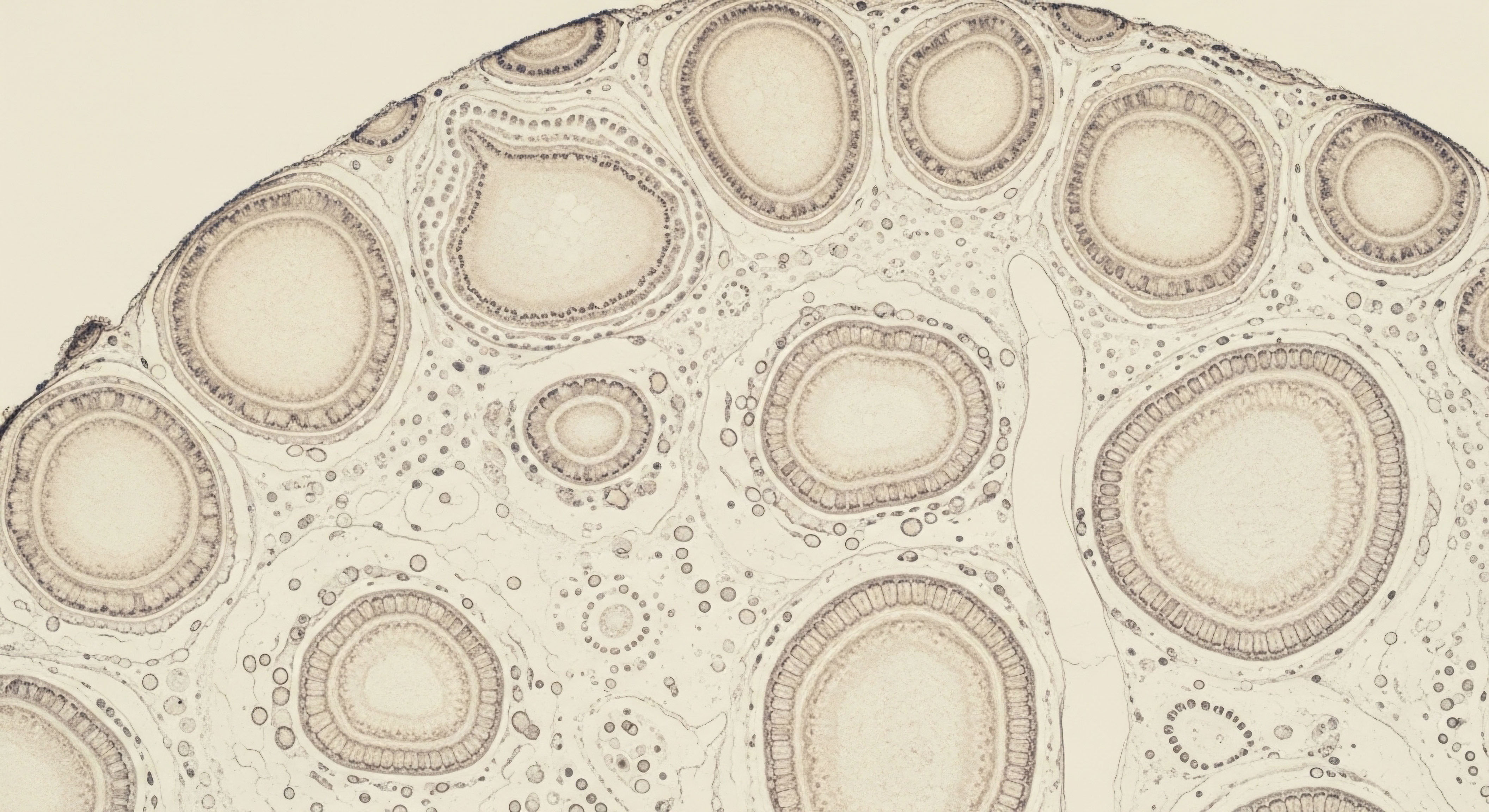

Fundamentals
Perhaps you have experienced a persistent, subtle shift in your daily experience ∞ a lingering fatigue that defies a good night’s rest, a quiet erosion of drive, or a sense that your body simply does not respond as it once did.
These feelings are not merely signs of aging or stress; they often signal a deeper conversation occurring within your biological systems. Your body communicates through an intricate network of chemical messengers, and among the most significant are hormones. Understanding these internal signals represents a powerful step toward reclaiming your vitality and functional capacity.
Testosterone, often narrowly associated with male physiology, serves as a vital signaling molecule for both men and women. It contributes to energy levels, mood stability, cognitive sharpness, muscle mass maintenance, and bone density. When its metabolism is disrupted, the ripple effects extend throughout your entire system, impacting your overall well-being. Dietary choices play a profound role in this metabolic dance, acting as direct inputs that either support or hinder optimal hormonal function.

The Body’s Building Blocks and Hormonal Precursors
Every cell in your body requires specific raw materials to operate, and this holds particularly true for hormone synthesis. Steroid hormones, including testosterone, originate from cholesterol. This lipid molecule, often misunderstood, is indispensable for life. Your body produces cholesterol, and you also obtain it from dietary sources. The availability and quality of this precursor directly influence the initial steps of testosterone production.
Beyond cholesterol, the entire process of hormone creation and breakdown relies on a symphony of enzymes and cofactors. These biological catalysts require a steady supply of specific vitamins and minerals to function correctly. A diet lacking in these essential micronutrients can impede the enzymatic reactions necessary for healthy testosterone metabolism, leading to suboptimal levels or altered conversion pathways.
Dietary inputs directly influence the body’s capacity to synthesize and metabolize testosterone, impacting overall vitality.
Consider the analogy of a complex manufacturing plant. If the plant lacks specific raw materials or the specialized tools needed for assembly, the final product will be compromised or production will slow. Your endocrine system operates similarly. The foods you consume provide the raw materials and the operational support for this sophisticated internal factory.

Energy Balance and Hormonal Signaling
The quantity of energy you consume, alongside its composition, sends powerful signals to your endocrine system. Chronic caloric deficits, for instance, can signal a state of scarcity to the body, prompting it to downregulate non-essential functions, including reproductive hormone production. Conversely, excessive caloric intake, particularly from highly processed foods, can lead to metabolic dysregulation, which in turn impacts hormonal balance.
The body’s central energy sensor, the hypothalamic-pituitary-gonadal (HPG) axis, is highly sensitive to nutritional status. This axis, a complex communication loop involving the hypothalamus in the brain, the pituitary gland, and the gonads (testes in men, ovaries in women), orchestrates hormone production.
Nutritional signals, such as those from the hormone leptin, which reflects body fat stores, directly influence the activity of this axis. When energy intake is consistently misaligned with physiological needs, the HPG axis can become dysregulated, affecting testosterone output.


Intermediate
Moving beyond foundational concepts, we can now examine the specific clinical implications of dietary choices on testosterone metabolism. The interplay of macronutrients, micronutrients, and even the gut microbiome exerts a profound influence on the endocrine system’s intricate operations. Understanding these specific mechanisms allows for more targeted dietary interventions aimed at supporting hormonal equilibrium.

Macronutrient Ratios and Androgen Production
The balance of fats, proteins, and carbohydrates in your diet significantly impacts testosterone synthesis and its subsequent metabolic pathways. Dietary fats, particularly saturated and monounsaturated varieties, provide the necessary cholesterol precursor for steroid hormone production. Studies indicate that diets with adequate fat content, generally above 25% of total caloric intake, tend to support optimal testosterone levels. Conversely, severely restricted fat intake can lead to a reduction in circulating testosterone.
Carbohydrate intake also plays a role, primarily through its influence on insulin sensitivity. High carbohydrate diets, especially those rich in refined sugars, can contribute to insulin resistance. This condition, where cells become less responsive to insulin’s signals, is strongly associated with lower testosterone levels in men.
Insulin resistance can directly impair Leydig cell function in the testes, reducing their capacity to produce testosterone. Protein intake, while vital for muscle protein synthesis and overall health, appears to have a less direct, but still supportive, role in testosterone concentrations when consumed within recommended ranges.
Balanced macronutrient intake, particularly sufficient healthy fats and controlled carbohydrates, supports healthy testosterone levels by influencing precursor availability and insulin sensitivity.

Micronutrient Catalysts for Hormonal Balance
Vitamins and minerals function as essential cofactors for the enzymatic reactions involved in testosterone synthesis and metabolism. Deficiencies in these vital compounds can create bottlenecks in the biochemical pathways.
- Zinc ∞ This mineral is indispensable for numerous enzymatic processes, including those involved in testosterone production. Zinc deficiency has been linked to hypogonadism.
- Vitamin D ∞ Functioning as a steroid hormone itself, vitamin D receptors are present in testicular Leydig cells. Adequate vitamin D levels correlate with higher testosterone concentrations.
- Magnesium ∞ This mineral plays a role in reducing oxidative stress and improving insulin sensitivity, both of which indirectly support healthy testosterone levels.
- Selenium ∞ An antioxidant mineral, selenium contributes to testicular health and may protect against oxidative damage that could impair testosterone production.
While observational studies suggest a link between micronutrients and sex hormones, randomized controlled trials often show limited direct effects of supplementation in individuals with adequate baseline levels. This underscores the importance of obtaining these nutrients through a varied, nutrient-dense diet rather than relying solely on supplements.

How Does Gut Health Influence Testosterone Metabolism?
The gut microbiome, a complex ecosystem of microorganisms residing in your digestive tract, increasingly reveals its profound influence on systemic health, including endocrine function. This “virtual endocrine organ” produces metabolites that can impact hormone signaling and metabolism throughout the body.
Dysbiosis, an imbalance in the gut microbiota, can contribute to systemic inflammation and impaired nutrient absorption, both of which negatively affect hormonal health. Certain gut bacteria influence the conversion and excretion of hormones, including testosterone and its metabolites. They can also modulate the activity of enzymes like beta-glucuronidase, which can deconjugate hormones, potentially leading to their reabsorption and altered circulating levels. A healthy, diverse gut microbiome supports efficient hormone detoxification and overall metabolic well-being.
Consider the following dietary strategies to support testosterone metabolism ∞
| Dietary Component | Impact on Testosterone Metabolism | Food Sources |
|---|---|---|
| Healthy Fats | Provides cholesterol precursor, supports cell membrane integrity. | Avocado, olive oil, nuts, seeds, fatty fish. |
| Quality Protein | Amino acids for enzyme synthesis, satiety, muscle maintenance. | Lean meats, poultry, fish, eggs, legumes. |
| Complex Carbohydrates | Stable energy, supports insulin sensitivity. | Whole grains, vegetables, fruits. |
| Zinc | Cofactor for testosterone synthesis enzymes. | Oysters, red meat, pumpkin seeds. |
| Vitamin D | Direct hormonal signaling, receptor activation. | Sunlight exposure, fatty fish, fortified foods. |
| Magnesium | Reduces oxidative stress, improves insulin sensitivity. | Leafy greens, nuts, dark chocolate. |
| Probiotics/Prebiotics | Supports gut microbiome, reduces inflammation. | Fermented foods, fiber-rich vegetables. |


Academic
To truly appreciate the intricate relationship between dietary choices and testosterone metabolism, we must examine the underlying molecular and systems-biology mechanisms. This requires a deeper understanding of enzymatic pathways, feedback loops, and the broader metabolic environment that influences androgenic activity.

Enzymatic Conversions and Dietary Modulators
Testosterone, once synthesized, undergoes various enzymatic conversions that dictate its biological activity and eventual clearance. Two key enzymes in this process are 5-alpha reductase and aromatase (CYP19A1). 5-alpha reductase converts testosterone into the more potent androgen, dihydrotestosterone (DHT), which plays a significant role in hair growth, prostate health, and skin characteristics. Aromatase, conversely, converts testosterone into estradiol, a primary estrogen. The balance between these two pathways is critical for overall hormonal health in both men and women.
Dietary compounds can directly modulate the activity of these enzymes. For instance, certain polyphenols found in green tea and red wine have demonstrated inhibitory effects on aromatase activity in vitro. This suggests a potential mechanism by which specific dietary components could influence the testosterone-to-estrogen ratio.
Similarly, compounds found in saw palmetto and other botanicals are known to inhibit 5-alpha reductase, altering the conversion to DHT. The precise impact of whole foods on these enzymatic activities in vivo remains an active area of investigation, yet the mechanistic plausibility is clear.
Dietary components can influence the activity of enzymes like aromatase and 5-alpha reductase, altering the balance of testosterone and its metabolites.

The Hypothalamic-Pituitary-Gonadal Axis and Nutritional Signaling
The HPG axis serves as the central command center for reproductive hormone regulation. Its function is exquisitely sensitive to metabolic signals, providing a direct link between nutrition and testosterone production. The hypothalamus releases gonadotropin-releasing hormone (GnRH) in a pulsatile manner, which stimulates the pituitary gland to secrete luteinizing hormone (LH) and follicle-stimulating hormone (FSH). LH then acts on Leydig cells in the testes to produce testosterone.
Nutritional status directly influences GnRH pulsatility. Chronic energy deficits, whether from severe caloric restriction or excessive exercise without adequate fueling, can suppress GnRH release, leading to reduced LH and FSH, and consequently, lower testosterone. Conversely, chronic overnutrition, particularly diets high in refined carbohydrates and unhealthy fats, can induce systemic inflammation and insulin resistance, which also disrupt HPG axis signaling. Adipose tissue, especially visceral fat, acts as an endocrine organ, producing inflammatory cytokines and aromatase, further complicating hormonal balance.
Consider the intricate feedback loops ∞
- Hypothalamic Regulation ∞ Nutritional signals, including glucose, fatty acids, and hormones like leptin and ghrelin, are sensed by specific neurons in the hypothalamus. These signals modulate GnRH secretion.
- Pituitary Response ∞ Altered GnRH pulsatility directly impacts the pituitary’s release of LH and FSH, which are the primary drivers of gonadal hormone production.
- Gonadal Output ∞ The testes respond to LH by synthesizing testosterone. Disruptions at higher levels of the axis directly translate to altered testosterone output.

Inflammation, Oxidative Stress, and Androgen Status
Chronic low-grade inflammation and oxidative stress represent significant biological stressors that can impair testosterone metabolism. Dietary patterns rich in processed foods, unhealthy fats, and refined sugars promote systemic inflammation. This inflammatory state can directly inhibit steroidogenesis in the testes and increase the activity of aromatase, leading to higher estrogen conversion.
Oxidative stress, characterized by an imbalance between free radical production and antioxidant defenses, damages cellular components, including those involved in hormone synthesis. Testicular cells are particularly vulnerable to oxidative damage. Diets rich in antioxidants, such as those found in fruits, vegetables, and certain spices, can mitigate oxidative stress, thereby supporting testicular function and testosterone production.
| Metabolic Factor | Dietary Influence | Impact on Testosterone |
|---|---|---|
| Insulin Resistance | High refined carbohydrate intake, excessive calories. | Decreased Leydig cell function, lower testosterone synthesis. |
| Chronic Inflammation | Processed foods, unhealthy fats, low fiber. | Inhibition of steroidogenesis, increased aromatase activity. |
| Oxidative Stress | Lack of antioxidants, exposure to toxins. | Damage to testicular cells, impaired hormone production. |
| Gut Dysbiosis | Low fiber, high sugar, lack of fermented foods. | Altered hormone deconjugation, systemic inflammation. |
| Adiposity (Visceral) | Caloric surplus, sedentary lifestyle. | Increased aromatase activity, higher estrogen. |
The intricate web of metabolic pathways underscores that dietary choices are not isolated events but rather continuous inputs that shape your internal hormonal landscape. A comprehensive approach to optimizing testosterone metabolism must therefore integrate precise nutritional strategies with an understanding of these deep biological interactions.

Can Specific Dietary Patterns Alter Androgen Receptor Sensitivity?
Beyond direct hormone synthesis and metabolism, dietary patterns may also influence the sensitivity of androgen receptors, the cellular docking stations that allow testosterone to exert its effects. While direct evidence is still developing, certain dietary components, particularly those that influence inflammation and cellular signaling, could theoretically modulate receptor expression or binding affinity. This area of research holds promise for further refining personalized wellness protocols.

References
- Pitteloud, N. et al. “Increasing Insulin Resistance Is Associated with a Decrease in Leydig Cell Testosterone Secretion in Men.” The Journal of Clinical Endocrinology & Metabolism, vol. 90, no. 5, 2005, pp. 2636-2641.
- Whittaker, J. and T. D. Lowes. “Manipulation of Dietary Intake on Changes in Circulating Testosterone Concentrations.” Nutrients, vol. 13, no. 5, 2021, p. 1649.
- Hamalainen, E. et al. “The Effects of Diet on Circulating Sex Hormone Levels in Men.” Nutrition Research Reviews, vol. 20, no. 1, 2007, pp. 1-12.
- Janjuha, R. et al. “Effects of Dietary or Supplementary Micronutrients on Sex Hormones and IGF-1 in Middle and Older Age ∞ A Systematic Review and Meta-Analysis.” Nutrients, vol. 12, no. 5, 2020, p. 1457.
- Kataoka, T. et al. “A Review of Foods and Food Supplements Increasing Testosterone Levels.” Journal of Men’s Health, vol. 17, no. 2, 2021, pp. 4-14.
- Dandona, P. et al. “Testosterone is an Insulin Sensitizer and Metabolic Hormone.” Diabetes Care, vol. 39, no. 2, 2016, pp. 263-271.
- Paoli, A. et al. “The Effect of Macronutrients on Reproductive Hormones in Overweight and Obese Men ∞ A Pilot Study.” Nutrients, vol. 11, no. 12, 2019, p. 3059.
- Monteiro, R. et al. “Modulation of Aromatase Activity by Diet Polyphenolic Compounds.” Journal of Agricultural and Food Chemistry, vol. 54, no. 10, 2006, pp. 3535-3540.
- Rao, P. M. et al. “Testosterone and Insulin Resistance in the Metabolic Syndrome and T2DM in Men.” Nature Reviews Endocrinology, vol. 9, no. 8, 2013, pp. 479-493.
- Babcock, M. C. et al. “Oxidative Stress and Inflammation Are Associated With Age-Related Endothelial Dysfunction in Men With Low Testosterone.” The Journal of Clinical Endocrinology & Metabolism, vol. 107, no. 2, 2022, pp. e500-e514.
- Dhindsa, S. et al. “Relationship Between Testosterone Levels, Insulin Sensitivity, and Mitochondrial Function in Men.” Diabetes Care, vol. 28, no. 7, 2005, pp. 1789-1793.
- Al-Dujaili, E. A. S. and J. C. A. Al-Dujaili. “The Secret Life of Microbes ∞ The Expanding Role of Microbes in Shaping Endocrine Health ∞ The Role of Microbes in Endocrinology Health.” Scifiniti, vol. 1, no. 1, 2023, pp. 1-10.

Reflection
Having explored the intricate connections between dietary choices and testosterone metabolism, you now possess a more comprehensive understanding of your body’s remarkable adaptive capacity. This knowledge is not merely academic; it represents a foundation for informed self-stewardship. Your personal biological systems are dynamic, constantly responding to the inputs you provide. Recognizing this interplay allows you to move beyond passive observation of symptoms toward active participation in your health journey.
The path to hormonal equilibrium is often unique to each individual, reflecting their distinct genetic predispositions, lifestyle factors, and metabolic landscape. This exploration serves as an invitation to consider how your daily choices contribute to your overall vitality. Armed with this deeper understanding, you can begin to recalibrate your approach, aligning your nutritional strategies with your body’s inherent wisdom. This is a journey of continuous learning and refinement, where each thoughtful decision contributes to a more vibrant and functional self.



